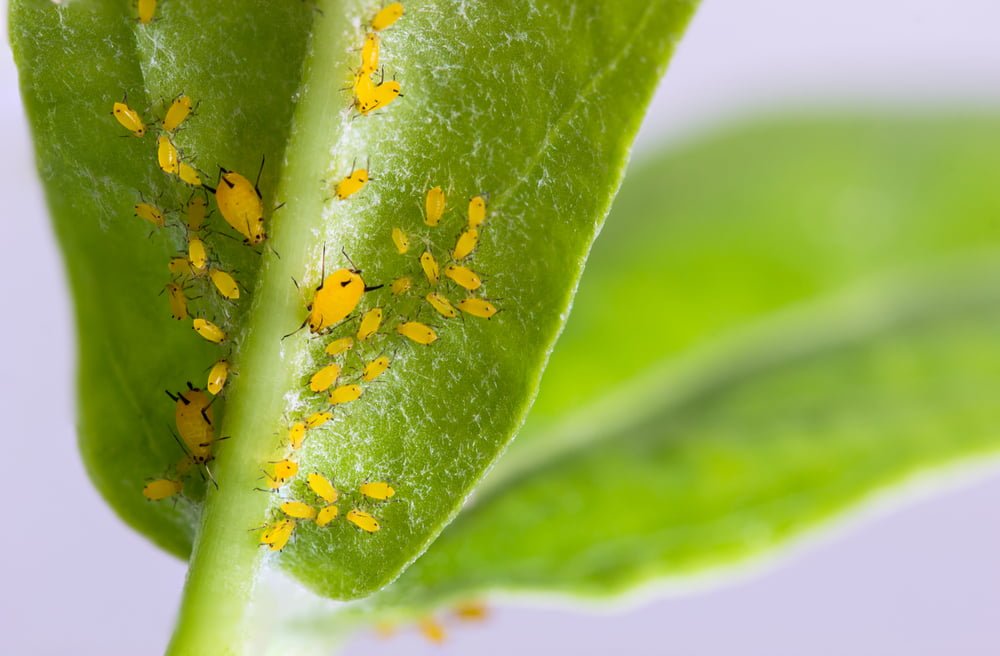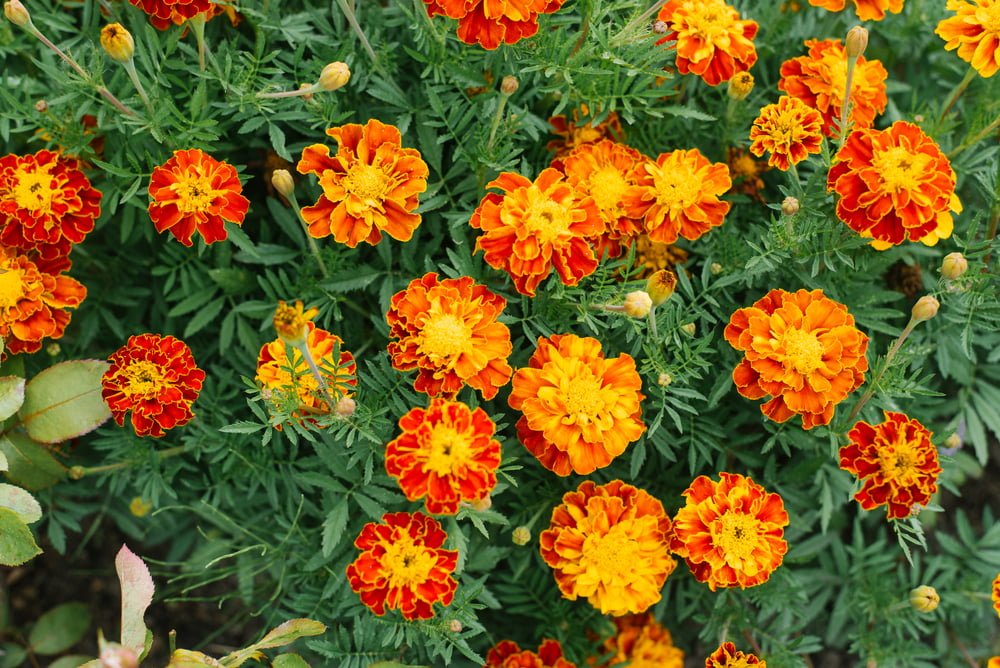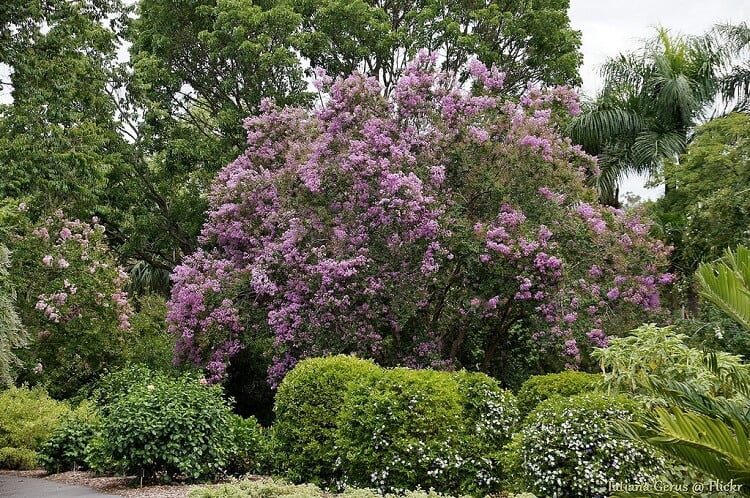Tired of pesky insects and critters ruining your beautiful garden? You’re not alone! Many people spend hours working on their gardens, only to find them destroyed by unwanted pests.
But don’t worry – there’s a natural solution that’s safe for you, your family, and our planet. Did you know that some plants and essential oils can actually help keep these annoying creatures away from your precious flowers and veggies? That’s right!
In this article, we’ll explore the wonderful world of natural pest repellents that are perfect for any gardener who wants to protect their hard work without using harmful chemicals. So sit back, relax, and let Mother Nature lend you a helping hand in guarding your beloved garden.
The Power Of Aromatic Herbs
Nature has a funny way of providing solutions to problems we often face in our gardens. One such solution lies in the power of aromatic herbs, which not only add flavor and fragrance to our culinary dishes but also serve as natural pest repellents.
By planting these amazing herbs strategically around your garden or using their essential oils, you’ll create a safe haven for your beloved plants while keeping pesky insects at bay.
Imagine walking through your lush garden filled with beautiful basil, fragrant lavender, and pungent rosemary – all working together to protect your precious vegetables from destructive pests. Basil is known to repel flies and mosquitoes; lavender keeps moths, fleas, and aphids away; and rosemary deters cabbage worms and carrot flies. These are just a few examples of how these potent herbs can help maintain a healthy garden environment without resorting to harmful chemicals.
So next time you’re planning your garden layout or looking for an eco-friendly alternative to chemical pesticides, consider incorporating some aromatic herbs into the mix. Not only will they provide protection against common pests naturally, but they’ll also enhance the overall beauty and aroma of your outdoor space.
With this simple yet effective strategy, you’ll be able to enjoy a thriving garden while keeping it safe from harm’s way!
Marigolds: A Garden’s Best Friend
Marigolds are a great addition to any garden because of their bright colors and pest repellent properties. They contain pyrethrum, a natural insecticide that repels garden pests like aphids, squash bugs, and Japanese beetles.
Not only do marigolds help keep unwanted pests away, but they also attract beneficial insects like ladybugs, which help keep the garden healthy. These flowers are easy to grow and require little maintenance, making them an ideal choice for any gardener.
They also have a lot of other benefits, such as improving soil quality and acting as a natural fertilizer. With all these great advantages, it’s no wonder marigolds are a gardener’s best friend!
Marigolds’ Properties
Marigolds are a garden’s best friend, and they’re not just pretty to look at. These vibrant flowers possess unique properties that help protect your plants from pesky pests.
They produce a strong scent that many insects find unappealing, making them an excellent natural pest repellent. One of the marigold’s most remarkable abilities is its capacity to release compounds called thiophenes into the soil. Thiophenes have been known to deter harmful nematodes – tiny worms that can wreak havoc on your garden by feeding on plant roots.
By planting marigolds close to other plants in your garden, you’ll create a safe haven for those vulnerable vegetables and flowers! Another fantastic thing about marigolds is their attraction to beneficial insects like ladybugs and lacewings. These helpful critters prey on aphids, mites, and other harmful bugs that might otherwise munch away at your precious plants.
So not only do marigolds keep the bad guys out, but they also bring in some good friends as backup! It’s no wonder why so many gardeners consider these beautiful blooms essential additions to their gardens.
Benefits
With all these amazing pest-fighting abilities, it’s clear that marigolds offer a whole bunch of benefits to your garden.
But wait – there’s more!
These colorful flowers aren’t just about keeping the bad guys at bay; they also play a vital role in improving your garden’s overall health and well-being.
Marigolds help enrich the soil by releasing nutrients as they decompose, making it easier for other plants to grow strong and healthy.
Plus, their bright blooms not only add beauty to your outdoor space but also serve as an important food source for pollinators like bees and butterflies.
By attracting these essential critters to your garden, you’re promoting biodiversity and helping maintain a balanced ecosystem that keeps everything running smoothly.
So go ahead and plant those marigolds with confidence – you’ll be creating a safer, healthier environment where all your favorite plants can thrive and flourish together!
Pest Repellent Effects
Now that we’ve seen how marigolds can improve your garden’s overall health and well-being, let’s dive into one of their most impressive abilities: pest repellent effects.
You see, these vibrant flowers aren’t just pretty to look at; they’re hard workers when it comes to keeping pesky insects away from your precious plants!
Marigold varieties such as the African and French types produce a strong scent that many unwanted bugs simply can’t stand. This means they’ll be less likely to invade your garden and munch on your beloved veggies or flowers.
But that’s not all – marigolds also have a secret weapon hidden beneath the soil. Their roots release chemicals called alpha-terthienyls, which are toxic to harmful nematodes (tiny worm-like creatures) living underground.
These pests feed on plant roots, causing damage and making it difficult for them to grow properly. But with marigolds in place, those nasty nematodes don’t stand a chance!
So there you have it – planting marigolds is like having an army of natural bodyguards protecting your garden from unwelcome intruders. And who wouldn’t want that extra sense of security when tending to their cherished outdoor haven?
Lavender: Beauty And Pest Protection
One of the most beautiful and versatile plants you can grow in your garden is lavender. Not only does it add a splash of color with its lovely purple flowers, but it also gives off a delightful fragrance that many people find calming and soothing.
But did you know that this amazing plant has another hidden talent? Lavender acts as an excellent natural pest repellent, helping to keep those pesky insects away from your cherished blossoms.
Lavender works its magic by producing essential oils within its leaves and flowers that are simply irresistible for humans but highly unappealing to common garden pests like ants, mosquitoes, moths, and even rabbits! By planting lavender near other plants or using lavender essential oil around your garden area, you’re sending out a clear signal to unwanted critters: ‘Stay away!’
Plus, since lavender is safe for both pets and children, there’s no need to worry about any harmful side effects. So why not give lavender a try in your own backyard oasis?
By incorporating this fragrant powerhouse into your gardening routine, not only will you enjoy the beauty and aroma it provides, but you’ll also have peace of mind knowing that your precious plants are protected against damaging pests. It’s truly a win-win situation for all involved – except maybe those bothersome bugs who won’t be making themselves at home among your prized blooms anymore!
The Citrusy Scent Of Lemongrass
Lemongrass is not only a popular ingredient in Asian cuisine, but it’s also an amazing natural pest repellent.
This tall perennial grass emits a strong citrus-like aroma that many insects find unbearable.
It’s no wonder why so many people love having this plant around their garden; the delightful scent of lemongrass keeps pests at bay while providing a comforting sense of safety.
Another great thing about lemongrass is that it’s easy to grow and maintain.
You can either start by planting seeds or simply propagate from existing stalks.
Just make sure your lemongrass has access to plenty of sunlight and well-draining soil, and you’ll have a thriving insect-repelling barrier before you know it!
Plus, as the plants mature, they form thick clumps which act like protective walls against unwanted critters, giving you even more peace of mind.
So next time you’re looking for ways to keep your garden safe from harmful pests without resorting to harsh chemicals, consider adding some lovely lemongrass plants to your outdoor space.
Not only will your garden be protected naturally, but you’ll also enjoy the soothing aroma wafting through the air on warm summer evenings.
With its ease of growth and powerful pest-deterring properties, lemongrass truly makes for an excellent addition to any garden seeking refuge from bothersome bugs.
The Mighty Catnip Plant
As we’ve seen, lemongrass can be a powerful ally in keeping pests at bay. However, it’s not the only plant that can help protect your garden from unwanted critters. Enter the mighty catnip plant!
This perennial herb is well-known for its ability to attract feline friends and drive them wild with delight, but did you know that it can also serve as an effective natural pest repellent? That’s right; this unassuming plant packs quite a punch when it comes to deterring insects.
There are several benefits of using catnip in your garden:
- It repels various pests:
- Aphids
- Japanese beetles
- Squash bugs
- Ants
- Cockroaches
- It attracts beneficial insects and pollinators such as lacewings, ladybugs, and bees.
- Its strong scent helps mask other plants’ odors, making it harder for pests to find their preferred hosts.
Catnip is easy to grow and requires little maintenance. Planting catnip around the borders of your garden or interspersing it among your vegetables and flowers will create an invisible barrier against many common pests. Additionally, if you have cats roaming around your yard, they’ll appreciate having some fresh catnip leaves to munch on – just make sure they don’t trample over your other plants in the process!
So there you have it – another potent weapon in your arsenal of natural pest repellents. With aromatic lemongrass and protective catnip working together, those pesky invaders won’t stand a chance against your thriving garden sanctuary.
As you continue exploring the world of organic gardening methods, remember that nature provides us with plenty of tools to keep our gardens healthy and vibrant without resorting to harmful chemicals.
Harnessing The Strength Of Garlic
Garlic is well-known for its strong smell and taste, which make it a popular ingredient in many dishes. But did you know that this pungent plant can also be an effective pest repellent?
That’s right! Garlic has the power to protect your garden from unwanted pests while keeping things natural and safe.
To harness garlic’s powerful properties, you can create a simple spray using just water and crushed cloves. Simply mix one part crushed garlic with five parts water in a spray bottle and let the mixture sit overnight.
The next day, strain out any remaining chunks of garlic, and your homemade pest repellent is ready to use! Spray your plants generously every few days or after rainfall to keep bugs at bay without resorting to harmful chemicals.
So there you have it – garlic not only adds flavor to our meals but also helps us maintain a healthy garden free of pesky intruders. By using this natural remedy, we are not only protecting our precious plants but also taking care of ourselves by reducing exposure to toxic substances commonly found in commercial pesticides.
So go ahead and give this amazing trick a try; both your garden and your family will thank you for it!
Basil: A Culinary And Pest-Repelling Delight
Basil is not only a popular herb for cooking, but it also serves as an effective natural pest repellent! This delightful plant has many benefits that make it perfect for gardens and homes. It’s easy to grow, smells wonderful, and helps keep pesky insects at bay.
Here are some reasons why basil is great for deterring pests:
- Basil contains compounds such as eugenol and citronellal which naturally repel mosquitoes, flies, and other unwanted insects.
- Planting basil near tomatoes can help protect the tomato plants from harmful bugs like aphids and whiteflies.
- The strong scent of basil confuses pests’ sense of smell, making it more difficult for them to locate their desired host plants.
So how do you use basil as a pest repellent? It’s simple! Just plant it in your garden or place potted basil around outdoor seating areas where you want to keep bugs away.
You can even rub crushed basil leaves on your skin to deter mosquitoes when you’re outside enjoying warm summer evenings. Plus, having fresh basil handy makes cooking delicious meals easy too!
Using this versatile herb in your yard is a fantastic way to enjoy its culinary perks while simultaneously keeping those annoying critters out of your space.
Not only does planting basil create a safer environment without resorting to harsh chemicals, but it also adds beauty and fragrance to your surroundings!
So go ahead – cultivate some lovely basil plants in your garden or home today and experience the joy they bring both inside and out.
Rosemary: Aromatic And Effective
Rosemary is an aromatic plant that also happens to be an effective natural pest repellent.
Its strong scent can keep away bugs, and it’s an easy-to-find ingredient for homemade bug repellent sprays.
It’s effectiveness has been proven to ward off insects, making it a great choice for keeping your garden pest-free.
Plus, it smells great too!
Rosemary’s Aroma
Imagine walking through your garden and catching a whiff of the fresh, invigorating scent of rosemary. It’s not just you who finds its aroma appealing; this versatile herb is known for repelling unwanted pests in your garden too!
By planting rosemary, you’re creating a natural barrier that’ll keep those pesky bugs at bay while providing a safe haven for you and your plants.
Rosemary’s strong fragrance comes from essential oils within its leaves. These oils contain compounds like camphor, pinene, and limonene which are proven to deter insects such as aphids, whiteflies, and cabbage moths.
Not only does it protect itself from these annoying critters, but neighboring plants also benefit from its presence. So, by adding some lovely rosemary bushes to your garden or landscape design, you’ll be taking care of multiple issues with one simple solution!
The best part about using rosemary as a pest repellent is that it’s completely safe – no harmful chemicals required! In fact, many people use rosemary essential oil around their homes for various purposes including cleaning products and aromatic diffusers.
This means that when you plant rosemary in your garden or incorporate its essential oil into your daily routine, you can feel confident knowing that you’re choosing an effective yet secure method for keeping pests at bay. Plus, did we mention how amazing it smells? Your garden will not only be bug-free but filled with the delightful scent of fresh rosemary all season long!
Rosemary’s Effectiveness
So, you might be wondering just how effective rosemary really is at keeping those pesky insects away from your precious plants.
Well, let us assure you that this hardy herb packs a powerful punch against unwanted garden invaders! Its unique combination of aromatic compounds works wonders in deterring a wide range of pests, giving both it and its neighboring plants the safety they need to thrive.
When planted strategically around your garden or added as an essential oil to natural repellents, rosemary can offer significant protection without harming beneficial insects like bees and butterflies. This makes it a fantastic choice for anyone looking to create a safe haven for their plants while also promoting a healthy ecosystem within their garden space.
Plus, with rosemary’s low maintenance requirements and ability to grow in various climates, there’s no reason not to give this amazing herb a try!
In addition to being highly-effective at repelling pests, the delightful scent of rosemary brings an extra layer of enjoyment to your outdoor oasis.
So go ahead – plant some rosemary bushes or experiment with its essential oil today! You’ll love the sense of security it provides as well as the lovely fragrance that fills your garden all season long.
Peppermint Oil: A Refreshing Deterrent
Imagine walking through a garden filled with lush greenery, vibrant flowers, and the invigorating scent of peppermint. You might not realize it, but that refreshing aroma is doing more than just pleasing your senses – it’s also providing a natural and effective deterrent against common garden pests. Peppermint oil has been used for centuries as an alternative to harmful chemicals, keeping gardens healthy while ensuring the safety of our environment and loved ones.
| Pest | Effect of Peppermint Oil |
|---|---|
| Ants | Disrupts their scent trails; repels them from areas |
| Aphids | Repels them from plants |
| Cabbage Looper | Deters egg-laying on leaves |
| Spiders | Acts as a natural repellent |
The table above illustrates some examples of how peppermint oil can help protect your garden from unwelcome critters. By incorporating this essential oil into your gardening routine, you’ll be able to enjoy the benefits without exposing yourself or others to potentially dangerous substances. Plus, when you use peppermint oil in combination with other natural pest repellents like marigolds or lavender, you are creating an even stronger defense system for your plants.
Embracing the power of nature means choosing solutions that prioritize both effectiveness and safety. So next time you find yourself battling bugs in your garden oasis, consider reaching for that bottle of peppermint oil instead of harsh chemical alternatives. Not only will your plants thank you for keeping them safe and strong; so too will the planet we all call home.
Eucalyptus Oil: Potent And Pleasant
Eucalyptus oil is not only a potent pest repellent but also has an enjoyable scent that many people love.
This essential oil comes from the leaves of the eucalyptus tree, which is native to Australia and other parts of the world.
The strong aroma of this oil can keep away a variety of pests such as mosquitoes, flies, and even some rodents.
You might be wondering how eucalyptus oil works in keeping these pesky critters at bay. Well, it’s due to its main component called cineole or eucalyptol.
Cineole has powerful insect-repellent properties that make it difficult for pests to tolerate being around it.
Besides that, eucalyptus oil can also mask the scents that attract insects like carbon dioxide and lactic acid produced by our bodies.
This means bugs won’t even know you’re there when you use products containing this amazing oil!
So next time you’re planning on spending some quality time outdoors or tending your beloved garden, consider using eucalyptus oil-based products for protection against bothersome pests!
It’s a natural solution that doesn’t contain any harsh chemicals while providing a pleasant fragrance – making it perfect for those who want both effectiveness and safety in their pest control methods.
Plus, you’ll have peace of mind knowing you’re choosing an eco-friendly option that’s safe for humans and pets alike!
Neem Oil: A Versatile Solution
Moving from the potent eucalyptus oil, we dive into the world of neem oil—a versatile solution that’s like a Swiss army knife for gardeners.
Neem oil is extracted from the seeds and fruits of the neem tree (Azadirachta indica), which is native to India. This remarkable oil has numerous benefits in the realm of natural pest control as it deters a wide range of pests while being gentle on beneficial insects.
Neem oil works its magic by disrupting the life cycle of various pests. When applied to leaves or soil where these critters thrive, they lose their appetite and eventually starve. It also interferes with insect hormones, preventing them from maturing properly or laying eggs—thus breaking their reproductive chain.
The best part? Neem oil is safe for humans, pets, bees, butterflies, and other helpful creatures that keep your garden happy and healthy.
But wait! There’s more than just fantastic pest repellent properties in this unassuming bottle. Neem oil doubles as an effective fungicide due to its ability to combat fungal infections on plants such as blackspot, powdery mildew, and rust. It even helps ward off harmful nematodes lurking beneath the soil surface waiting to devour plant roots.
So go ahead—give neem oil a try and relish in its multi-faceted power against unwanted guests in your beloved garden sanctuary.
Cedarwood Oil: Nature’s Insect Repellent
Cedarwood oil is a natural and effective way to keep insects at bay in your garden. This essential oil comes from the bark of cedar trees, which are known for their insect-repellent properties.
Many people prefer using cedarwood oil over chemical pesticides because it’s safer for both humans and the environment.
One great thing about cedarwood oil is that it works on many types of common pests found in gardens. These include mosquitoes, ants, fleas, ticks, and even moths!
By simply adding a few drops of this oil to water or spraying it directly onto plants, you can help prevent these annoying critters from destroying your beautiful flowers and tasty vegetables.
So why not give cedarwood oil a try in your garden? Not only will you be protecting your plants from harmful insects but also creating a healthier environment for yourself and others around you. Plus, with its pleasant scent and all-natural ingredients, there’s no reason not to make this powerful essential oil part of your gardening routine!
Some FAQs
Are There Any Potential Negative Effects On Beneficial Insects Or The Environment When Using These Natural Pest Repellents?
While using natural pest repellents like plants and essential oils can be a safer alternative to harsh chemicals for keeping garden pests at bay, there might still be some potential negative effects on beneficial insects or the environment.
For example, certain strong-smelling plants could unintentionally repel helpful pollinators such as bees and butterflies, which are crucial for maintaining a healthy and diverse ecosystem in your garden.
Additionally, some essential oils may have toxic properties that affect aquatic life if they find their way into streams or rivers through runoff.
Therefore, it’s important to choose eco-friendly options carefully and consider how these natural solutions may impact not just the pesky critters we want to deter but also the valuable creatures that contribute positively to our gardens and the environment as a whole.
How Often Should I Apply Essential Oils Or Plant These Herbs In My Garden To Maintain Their Effectiveness In Deterring Pests?
To keep those pesky pests at bay, you’ll want to apply essential oils or plant your pest-deterring herbs regularly.
For essential oils, it’s best to mix them with water and a little bit of dish soap, then spray the solution on your plants every couple of weeks or after heavy rainfall.
As for planting herbs, make sure they’re part of your garden layout from the beginning and replace them if they start showing signs of stress or damage.
By staying consistent with these natural methods, you can enjoy a happy, healthy garden without worrying about harming beneficial insects or the environment!
Can I Use A Combination Of These Plants And Essential Oils To Create A More Potent Pest-Repelling Solution, Or Will It Be Less Effective If They Are Mixed Together?
Imagine your garden as a fortress, protected by an army of plants and essential oils working together to keep pesky invaders at bay.
Combining various natural pest repellents can indeed create a more potent defense system, enhancing their overall effectiveness in deterring unwanted critters from feasting on your precious plants.
By using a mix of aromatic herbs like basil, lavender, or rosemary alongside powerful essential oils such as neem or peppermint oil, you’re building a multi-layered barrier that pests will find hard to penetrate.
So don’t be afraid to experiment with different combinations; just remember to maintain the right balance for each element’s unique qualities to shine through and work harmoniously against those unwelcome intruders!
Are There Any Specific Garden Pests That Are Not Effectively Deterred By These Natural Repellents, And What Alternative Solutions Can Be Used For Those Pests?
While many garden pests can be deterred by natural repellents like plants and essential oils, there are some that might not be as effectively repelled.
For these stubborn critters, alternative solutions such as introducing beneficial insects or using organic pesticides may come in handy.
By creating a safe environment for friendly bugs like ladybugs and lacewings, they’ll help control the unwanted pests naturally.
Additionally, consider trying homemade remedies or eco-friendly products available on the market to keep your garden thriving without harming the good guys living there.
So don’t worry – even if those pesky pests seem resistant to your natural deterrents, you’ve got plenty of other options to protect your precious plants!
How Do These Natural Pest Repellents Compare In Effectiveness To Chemical Pesticides, And Are There Any Instances Where Using A Chemical Pesticide Would Be More Beneficial Or Necessary?
Did you know that natural pest repellents can be just as effective as chemical pesticides in many cases?
In fact, some plants and essential oils are known to deter up to 90% of certain garden pests!
However, there might still be instances where using a chemical pesticide would be more beneficial or necessary.
For example, if you’re dealing with a large-scale infestation or a particularly resistant pest species, chemical treatments may provide quicker results and better overall control.
But keep in mind that choosing the right solution for your garden is important – always consider the safety of your family, pets, and the environment when making decisions about pest control.
Conclusion
In my own garden, I’ve seen the power of natural pest repellents firsthand.
Last summer, I planted basil and marigolds alongside my tomatoes, and not only did they keep pests at bay, but they also added a beautiful touch to the space.
It’s amazing how Mother Nature provides us with such effective solutions that don’t harm our environment or beneficial insects.
Of course, it’s important to remember that these natural methods might not work for every single pest out there.
But in many cases, using plants and essential oils can be just as effective as chemical pesticides without all those nasty side effects.
So why not give it a try?
You might find yourself pleasantly surprised by the results!










